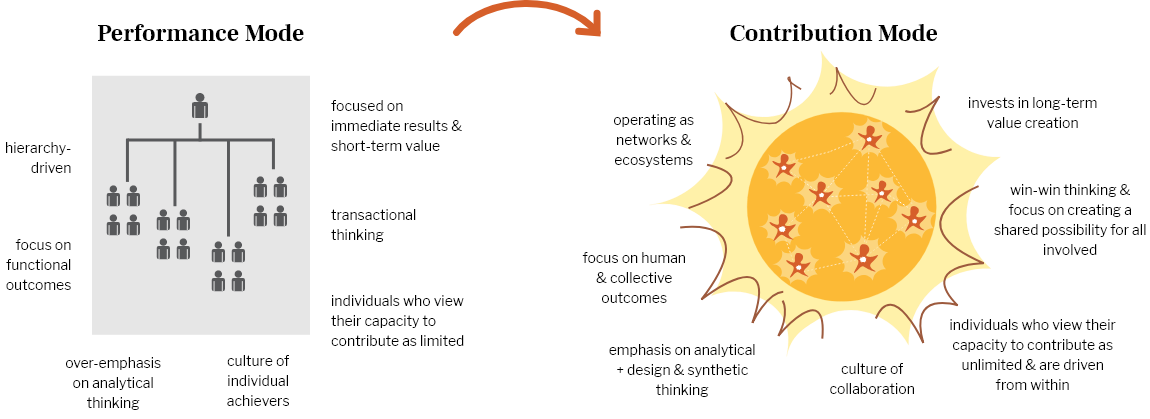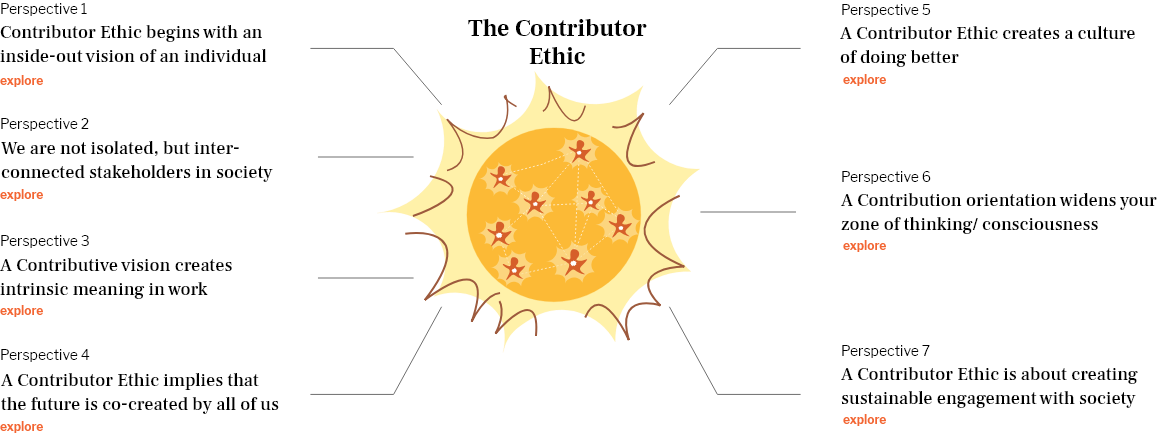Building a
Contributor Work Ethic
in society
– from a 'performance mode' to a 'contribution mode'


7 perspectives to help you understand the Contributor Ethic

One of the building blocks of the Contributor Ethic is an ‘inside-out vision of an individual’ rather than an ‘outside-in vision’.
When we have an inside-out vision of life, it means we are taking responsibility - for our life, our happiness, the world in which we live. This sense of responsibility leads to proactive action. It also leads to ownership. It also automatically leads to certain growth in us.
Many cultures have suffered from an outside-in vision of themselves – where they have assumed that others control their life – society, institutions, parents, teachers. This has led to complaining, pushing responsibility to others, and waiting for answers to come from “aid givers” of all kinds. An inside-out vision of life on the other hand, says I take responsibility and start making a difference.
One building block of the Contributor Ethic is that each one of us is a stakeholder in society. Each of us is not an isolated entity, only benefiting from society. We are a stakeholder in society, where we are impacting society and society is also impacting us.
This perspective translates into collective civic responsibility. For example, if roads are dirty, we are also responsible stakeholders in that road. We can participate in making it cleaner.
The Contributor Ethic is the core building block to make initiatives involving collective responsibility, such as Swachh Bharat, successful.
In recent years people have looked to leisure and experiencing luxury/ life as source of meaning. Which means that work itself is a drudgery and it is only the fruits of work that are meaning creating.
But the Contributor Ethic says that the meaning of work lies in work itself, in work well done. And work well done could mean work which has positive value and impact in the world, unleashing our own potential as human beings, or work which meets our criteria for “excellence”.
The Contributor Ethic therefore has a significant role to play in our efforts at employee engagement and creating individual meaning in the workplace.
Adopting the Contributor Ethic means that we are not just stakeholders in society, but are in fact, co-creators of a new society. This is critical to organizations who seek to respond dynamically, innovate across the organization, and seek to be flexible and adaptive.
Contributor Ethic also means enabling or supporting collective responses to shared problems. The absence of a culture of creating collective responses is a massive capability failure in society. Society does not know how to create these.
This is why a society that is so smart at solving complex tech problems, is so poor at getting nations and corporations to work together to solve problems involving collective intention.
How to build capabilities in society for finding collective responses to shared problems, capabilities which are missing today? Adopting the Contribution Ethic is about designing and building the capability to create collective responses to shared problems.
How do we move from a culture of status quo to a culture of getting better – a culture of continuous learning where we adopt the Contributor Ethic? We find opportunities to contribute, we find ways to improve. This triggers innovation, a cycle of positive change, an openness to new ideas, and new type of conversations. Conversations in a culture of doing better, are centered around “I did something well today, can I do something better tomorrow?” On the other hand, conversations in a culture of status quo are centered around “We have been doing things this way for years. Why change?”
The Contributor Ethic has an important role in an institution which seeks to move from a culture of status quo to a culture of getting better all the time. This works at an individual level, at a team level, at an organizational level and at a societal level.
There is a necessity to move from an ‘activity orientation’ to a ‘contribution orientation’.
When we have an activity orientation, what we see in front of us is the task which needs to be done. This is the mindset of an industrial worker, or of a job-worker (someone who is making something and just producing goods out of that).
From an ‘activity orientation’ once we move into a ‘contribution orientation’, we are trying to understand ourselves in terms the possibilities sitting within our roles. We are also trying to understand the kinds of impact/value that we can create in the entire system, given the possibilities in our roles.
This shift is critical. An ‘activity orientation’ diminishes the size of our world. It makes work life tedious, operating within a limited zone of consciousness.
A contribution orientation widens our zone of thinking/ of awareness/ of consciousness with which we operate. That is why it creates along with it a sense of freedom, a sense of openness, and therefore, also a sense of interdependence and collaboration.
In this sense, adopting the Contributor Ethic may be critical to addressing the challenge of alienation at work (especially routine work of all kinds).
If we want to create sustainable engagement with society, it cannot be where there are only takers or only givers. Any sustainable engagement involves a cycle.
One good example in nature is the water cycle - which begins with evaporation of water and ends with water coming back as rain.
Similarly, in the case of contemporary society, corporations and institutions need to enter into sustainable engagement with communities – not just push products into communities and extract money from them. We need to invest into communities, creating a trust surplus thereby. Communities give back to us in a different way. They reward us by buying our goods and services, by supporting our economic success, etc. That gives us the power to contribute more to society.
The Contributor Ethic therefore says that corporations need to create sustainable engagement – with society as a whole, just as we need to create sustainable engagement with the environment.
Similarly, in an individual career, can I have a sustainable engagement with my corporation. I may get a salary but can I contribute to the corporation in some meaningful way? Can I enable people around me? Can I strengthen the people around me?
The Contributor Ethic supports the creation of a sustainable engagement between (i) the individual and the corporation, (ii) the individual and the society at large, (iii) the corporation and society, (iv) the corporation and nature. There are multiple such sustainable engagements in society.
For more on the Contributor Ethic, visit the Dive Deeper Section
Building a Contributor Ethic in society: Making it happen
We are partnering with stakeholders across academia, government and industry to seed the contributor ethic across the length & breadth of the country.
Over the past decade, we have been developing scalable solution models - leveraging Illumine's Large-Scale Cognitive Change Technologies - which can help large numbers of people discover and assimilate a contributive vision of work.
These solution approaches have been piloted across a million people in India. See Case Snapshots.
Contributor Ethic for Organizational Leaders
Explore
Contributor Ethic for Public Services Personnel
Explore

Contributor Ethic for youth in colleges entering the workforce
Explore
Contributor Ethic for Educators
Explore
